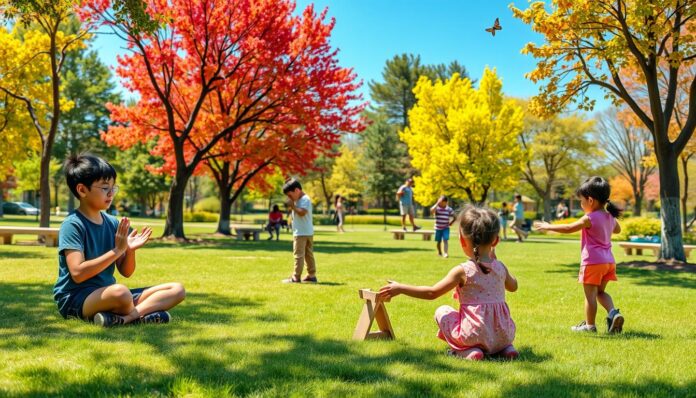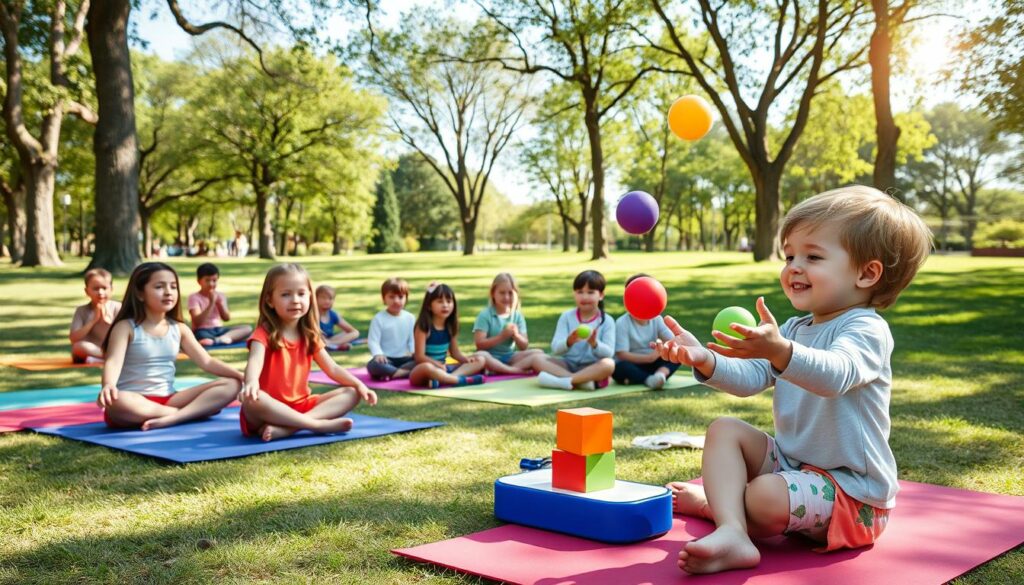Do you know that kids start learning self-control in elementary school? This skill helps them control impulses, think before acting, and wait for what they want. It’s key for their success in life. So, how can you help your kids grow this important trait? Explore our fun self-control exercises to empower your kids and help them grow.
Key Takeaways
- Self-control is a learnable skill that children develop over time, starting in elementary school.
- Practicing self-regulation activities can help kids build impulse control, patience, and emotional management.
- Games that integrate self-control, such as Balloon Float and Peanut Butter & Jelly Ball, make learning fun and engaging.
- Allowing time for play and practice is essential for kids to develop self-control and self-regulation.
- Developing self-control in childhood is linked to greater life satisfaction and happiness in adulthood.
Importance of Self-Control for Children
Self-control is key for kids’ well-being and success. Children who struggle with self-control exercises find it hard to manage their feelings and actions.
Why Self-Control Matters for Success
Children without self-control face emotional challenges and long-term unhappiness. A study showed 67% of kids find it hard to wait for rewards. This highlights the need for impulse control games and emotion management drills.
On the other hand, kids who delayed gratification in the marshmallow test did better in school. They had higher self-esteem and managed stress better.
Developing Self-Control in Elementary School
The years from 6 to 12 are vital for teaching self-control. Giving kids a calm space for mindfulness helps. Activities like Red Light/Green Light and Simon Says teach impulse control.
| Age Range | Self-Control Strategies |
|---|---|
| 2-5 years | Time-outs, praise for staying calm |
| 6-9 years | Walking away from frustration, positive reinforcement |
| 10-12 years | Analyzing situations, considering perceptions |
| 13-17 years | Thinking about long-term consequences, evaluating reactions |
Early teaching of self-control and resilience prepares kids for success in school and life.
Clear Expectations and Emotional Vocabulary
It’s key to set clear rules for kids to help them control themselves. They like knowing what’s expected of them. Teaching them to respect personal space is important.
Teaching kids to talk about their feelings is also vital. This helps them manage their emotions better. Using tools like emotion charts can help them learn to express their feelings.
Setting Defined Rules for Behavior
Children do better with clear rules. Here are some good ones:
- Keep your hands and feet to yourself
- Use a quiet voice when inside
- Wait your turn to speak
- Walk, don’t run, in the hallways
Helping Kids Express Feelings Through Words
It’s important to teach kids about their feelings. Here’s how:
- Use emotion charts or visuals in class
- Ask kids to share how they’re feeling
- Show them how to use emotional words
- Play games to practice feeling words
By teaching clear rules and emotional words, kids can grow and develop better.
Self Control Exercises For Kids
Teaching kids to control themselves is key for their success. It helps them do well in school, make good friends, and live a happy life. Luckily, there are many fun self-control exercises for kids to help them learn this important skill.
Self-Control Bubbles
The “Self-Control Bubbles” game is a great way to teach kids to control their impulses. They must resist popping bubbles floating around. This game helps them focus and wait, even when it’s hard.
Balloon Float Game
The “Balloon Float” game is another fun way to teach self-control. Kids have to keep a balloon up without using their hands. They use their breath and body to control it. This game teaches them to be mindful and self-regulated.
Peanut Butter & Jelly Ball
The “Peanut Butter & Jelly Ball” game is a fun way to teach kids to wait. They have to hold onto a ball without throwing it, even when they want to. This game helps them learn patience and control their impulses.
These self-control exercises for kids are great for teaching them important skills. They include self-regulation activities, impulse control games, and emotion management drills. By doing these activities, kids learn to manage their feelings, control their impulses, and delay gratification. These skills help them succeed in many areas of life.
“Self-control is the ability to regulate one’s emotions, thoughts, and behaviors in the face of temptations and impulses. It’s a critical skill that helps children navigate the challenges of daily life and achieve their goals.”
Adding these self-control exercises for kids to your teaching or parenting routine can really help. They give kids the skills they need to do well in school, at home, and in life.
Understanding Self-Regulation vs. Emotional Regulation
When teaching kids about self-control, it’s key to know the difference between self-regulation and emotional regulation. Self-regulation is about managing your energy level. Emotional regulation is about understanding and solving your feelings.
What is Self-Regulation?
Self-regulation is the base for emotional control. It helps calm the body and mind before dealing with emotions. When kids are in a fight-or-flight state, their brain’s thinking part stops working.
Sensory activities like stretching and balancing can calm the nervous system. This gets the brain ready to understand and manage emotions.
What is Emotional Regulation?
Emotional regulation is about knowing and solving your feelings. It’s vital for controlling impulses and managing anger. Mindfulness, positive self-talk, and breathing exercises help kids with emotional control.
Activities that boost creativity and problem-solving also help. They build the thinking skills needed for self-regulation.
FAQ
What is self-control and why is it important for children?
Self-control means being able to control our impulses and think before acting. It helps us delay getting what we want right away. This skill is key for kids’ happiness, friendships, and success in life.
Children aren’t born with self-control. It grows as they get older, starting in elementary school.
How can parents and teachers help children develop self-control?
Parents and teachers can set clear rules and help kids understand their feelings. They can also use games and activities to teach self-control. Visual aids like cool-down stations help too.
Teaching kids to express their feelings with words is also helpful.
What are some fun self-control exercises for kids?
Fun activities like self-control bubbles and balloon float games teach kids to resist the urge to act impulsively. These games help kids understand self-control and how to use it in real life.
How are self-regulation and emotional regulation different?
Self-regulation is about managing our energy and calmness. Emotional regulation is about understanding and solving our feelings. Self-regulation is the base for emotional regulation, helping us calm down before dealing with our emotions.
Sensory activities can calm the nervous system, making it easier to understand and manage our feelings.





